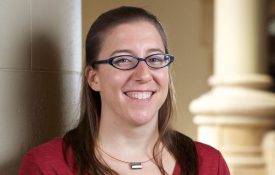-

APS Fellow Kristina Olson Receives Nation’s Top Honor for Early-Career Scientists
The 2018 Waterman Award recognizes Olson’s innovative research on social cognition and cognitive development in children.
-

Classical or Country? Music Choices Can Indicate Some Aspects of Personality
In particular, the personality traits ‘openness to experience’ and extraversion were uniquely associated with preferences for specific types of music
-

Mothers Plant the Seeds for Children’s Future Eco-Friendliness
A study of mothers and their children shows that children carry the influence of their mothers’ environmental behaviors into early adulthood.
-
Bouchard Receives Dunnette Prize for Study of Individual Difference
APS Fellow Thomas J. Bouchard, Jr., professor emeritus of psychology and Director of the Minnesota Center for Twin and Adoption Research at the University of Minnesota, has been awarded the Dunnette Prize for the Study of Individual Differences for his 20-year study establishing the role of genetic influence on a wide range of traits including intellectual ability, personality, vocational interests, religiosity, and political views.
-

Why ‘Sorry’ Seems to Be the Hardest Word
Offenders may not apologize if they have little concern for the victim, if they perceive a threat to their positive self-image, or if they predict that their apology won’t be effective.
-
Special Perspectives Issue Revisits Most Impactful APS Journal Articles
A new, special issue of Perspectives on Psychological Science marks the 30th anniversary of APS with a collection of reflections, insights, and forward-looking articles from authors of the 30 most-cited articles published in APS journals. In an introduction to the issue, Editor Robert J. Sternberg considers some of the factors that lead to high-impact articles, including how the research is presented, whether the research relates to issues that are important to scholars and lay people, and the extent to which the research propels the field forward. The authors discuss the origin and central hypotheses of their articles, and why they believe the work has had such an impact in the field.

